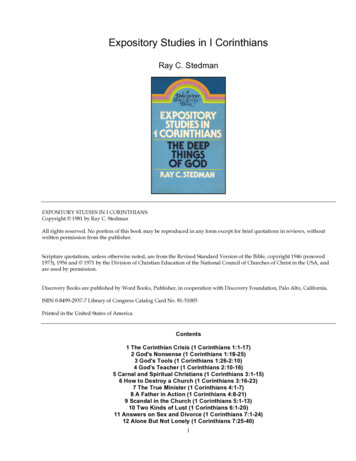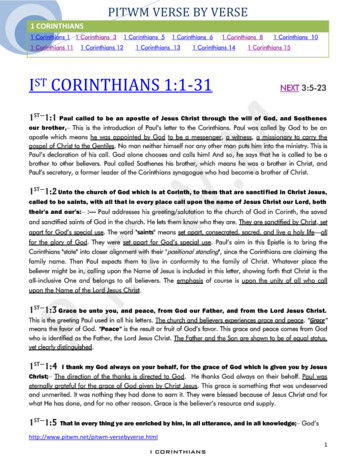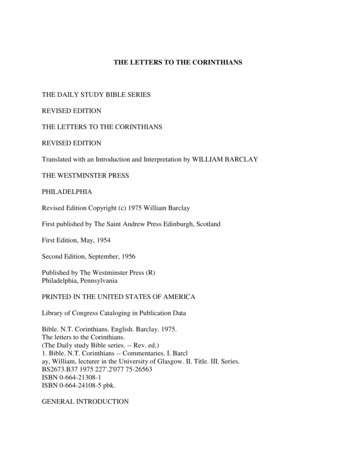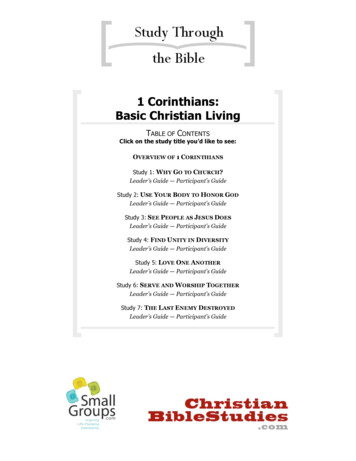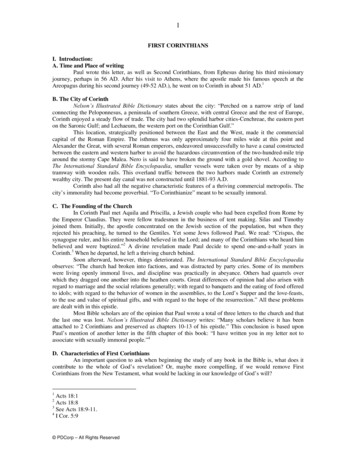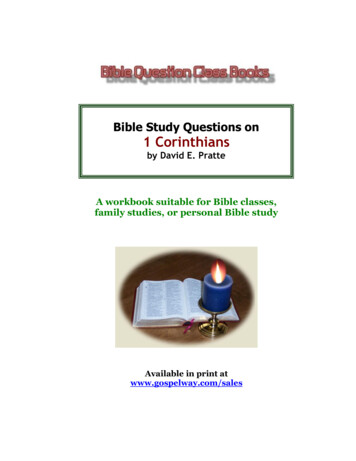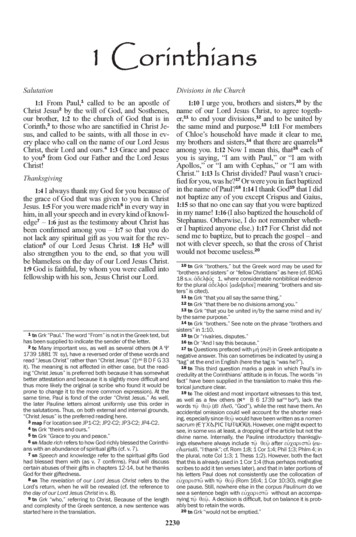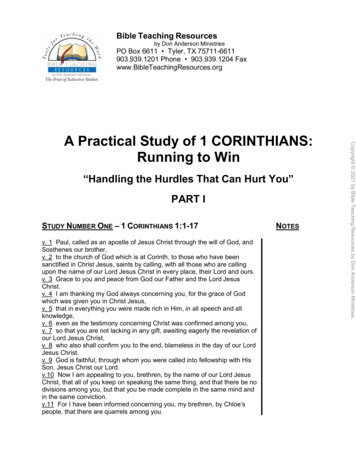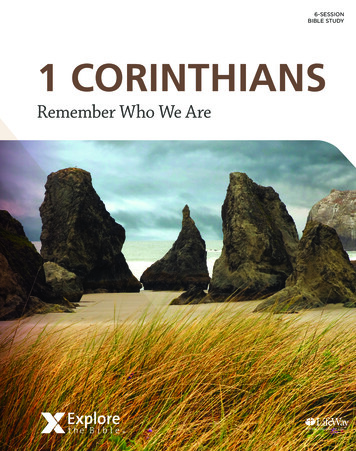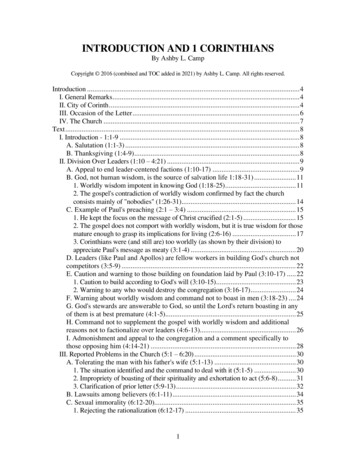
Transcription
INTRODUCTION AND 1 CORINTHIANSBy Ashby L. CampCopyright 2016 (combined and TOC added in 2021) by Ashby L. Camp. All rights reserved.Introduction . 4I. General Remarks . 4II. City of Corinth . 4III. Occasion of the Letter . 6IV. The Church . 7Text . 8I. Introduction - 1:1-9 . 8A. Salutation (1:1-3) . 8B. Thanksgiving (1:4-9) . 8II. Division Over Leaders (1:10 – 4:21) . 9A. Appeal to end leader-centered factions (1:10-17) . 9B. God, not human wisdom, is the source of salvation life 1:18-31) . 111. Worldly wisdom impotent in knowing God (1:18-25) . 112. The gospel's contradiction of worldly wisdom confirmed by fact the churchconsists mainly of "nobodies" (1:26-31). 14C. Example of Paul's preaching (2:1 – 3:4) . 151. He kept the focus on the message of Christ crucified (2:1-5) . 152. The gospel does not comport with worldly wisdom, but it is true wisdom for thosemature enough to grasp its implications for living (2:6-16) . 173. Corinthians were (and still are) too worldly (as shown by their division) toappreciate Paul's message as meaty (3:1-4) . 20D. Leaders (like Paul and Apollos) are fellow workers in building God's church notcompetitors (3:5-9) . 22E. Caution and warning to those building on foundation laid by Paul (3:10-17) . 221. Caution to build according to God's will (3:10-15). 232. Warning to any who would destroy the congregation (3:16-17) . 24F. Warning about worldly wisdom and command not to boast in men (3:18-23) . 24G. God's stewards are answerable to God, so until the Lord's return boasting in anyof them is at best premature (4:1-5). 25H. Command not to supplement the gospel with worldly wisdom and additionalreasons not to factionalize over leaders (4:6-13). 26I. Admonishment and appeal to the congregation and a comment specifically tothose opposing him (4:14-21) . 28III. Reported Problems in the Church (5:1 – 6:20) . 30A. Tolerating the man with his father's wife (5:1-13) . 301. The situation identified and the command to deal with it (5:1-5) . 302. Impropriety of boasting of their spirituality and exhortation to act (5:6-8) . 313. Clarification of prior letter (5:9-13) . 32B. Lawsuits among believers (6:1-11) . 34C. Sexual immorality (6:12-20). 351. Rejecting the rationalization (6:12-17) . 351
2. Prohibition stated directly (6:18-20) . 37IV. Matters the Church Wrote About (7:1-11:1). 38A. Marriage Issues (7:1-40) . 381. Error of denying sex within marriage (7:1-7) . 382. Widowers and widows (7:8-9) . 403. Divorce between Christian spouses (7:10-11) . 414. Divorce between Christian and non-Christian spouses (7:12-16) . 425. Basic principle that Christian conversion does not require changing socialrelationships (7:17-24) . 446. The case of betrothed women ("the virgins") (7:25-40) . 47a. Advice in light of the present distress (7:25-28) . 47b. Need to live as end-time people (7:29-35) . 48c. Reassurance regarding decision about marrying betrothed (7:36-38) . 50d. Reminder for the virgins who do marry (7:39-40) . 50B. Food Offered to Idols – (8:1 – 11:1) . 51Introduction to Section. 511. Christian behavior is not predicated solely on knowledge (8:1-6) . 522. Brotherly love requires that they forego eating in the temples (8:7-13) . 543. Response to those challenging the prohibition of attending temple meals bycalling into question his apostolic authority (9:1-23). 57a. Response re his not accepting their material support (9:1-18) . 57(1) He had a right to their support as an apostle (9:1-14) . 57(2) His renunciation of his right to their support (9:15-18). 60b. Response re his seemingly wishy-washy conduct in matters of socialrelationships (9:19-23) . 614. Exhortation to put great effort into Christian living (9:24-27) . 625. Baptism and participation in the Lord's Supper will not save them if they continueeating meals at the idol temples (10:1-5) . 636. Warning not to follow Israel's example (10:6-10) . 647. Those attending cultic meals with a sense of security must wake up to the danger(10:11-13) . 668. They must stop attending the temple meals (10:14-22). 669. Sacrificed meat that is later sold for home consumption (10:23-11:1) . 68V. Conduct in the Assembly (11:2 – 14:40) . 71A. Maintaining cultural sexual distinctions in attire (11:2-16) . 71Preliminary remarks . 711. Given continuing relevance of sexual distinctions for those in Christ, it isinappropriate to reject cultural sex distinctions in attire when speaking publicly to oron behalf of God (11:2-6). 742. Further reason why a man should not wear the covering but a woman should anda word on mutual dependence (11:7-12) . 783. Appeal to cultural analogy of long hair (11:13-16). 80B. The Lord's Supper (11:17-34). 811. The problem of maintaining social divisions (11:17-22). 812. Their keeping of the Supper was inconsistent with its original intent (11:23-26) 833. The seriousness of their sin regarding the Supper (11:27-32). 832
4. The solution (11:33-34) . 85C. Exercise of Spiritual Gifts (12:1 – 14:40) . 851. The presence of the Spirit in one's life is a function of one's relationship withChrist (12:1-3) . 852. The Spirit's gifts are too diverse to permit any one gift or group of gifts to serve asthe exclusive sign of the Spirit's presence (12:4-11) . 873. Body of Christ analogized to human body (12:12-30) . 90a. Just as a human body is a unity made up of many diverse members, so it is withthe body of Christ (12:12-14) . 90Excursus on the Spirit's Coming and His Manifestations in Acts 2, 8, 10, and 19 andon the Spirit's Association with Water Baptism . 92The Spirit's Coming and His Manifestations in Acts 2, 8, 10, and 19 . 92The Spirit's Association with Water Baptism . 96b. The body consists of different parts (12:15-20) . 98c. No part of the body is dispensable (12:21-26) . 99d. As with the human body, God has assigned different roles to different parts inthe body of Christ (12:27-30) . 1004. Exhortation to be enthusiastic regarding the "greater gifts" (12:31) . 1015. Discussion of love (13:1-13) . 102a. Love, not some spiritual gift, is the indispensable quality in a Christian'scharacter (13:1-3). 102b. Practical description of the love he's talking about (13:4-7) . 103c. Love is superior to spiritual gifts (13:8-13) . 1046. Command to be enthusiastic about the gift of prophecy (14:1-5) . 1077. Speaking in tongues does not benefit the hearers (14:6-13) . 1098. Only words that edify are fitting for the assembly (14:14-19) . 1109. As with believers, speaking in tongues will not benefit unbelievers butprophesying will (14:20-25) . 11210. The principle of edification applied to prophecy and tongues (14:26-33a) . 11511. Women are not to participate in the prophetic process in the assembly (14:33b36) . 11712. Conclusion of regulation of prophecy and tongues (14:37-40) . 120VI. Correcting a Mistaken View of the Resurrection 15:1-58. 121Excursus on Resurrection and Materialistic Eschatology . 121A. The gospel includes the bodily resurrection of Christ (15:1-11) . 127B. Logical conclusion of denying resurrection of the dead (15:12-19) . 130C. But Christ has been raised and is the firstfruits of Christian's who have died(15:20-28). 131D. Additional argument for truth of the resurrection (15:29-34) . 135E. Dispensing with a foolish objection to a bodily resurrection (15:35-44) . 138F. Support for claim of a spiritual body (15:45-49) . 143G. Conclusion of argument about the resurrection body (15:50-57). 144H. Exhortation not to be moved from this conviction (15:58) . 145VII. Closing 16:1-24 . 146A. Mechanics of collection for poor saints in Jerusalem (16:1-4) . 146B. Travel plans (16:5-11) . 1473
C. Apollos's return (16:12) . 148D. Concluding exhortations (16:13-18) . 148E. Final warning (16:19-24) . 149IntroductionI. General RemarksA. Like all of Paul's letters, 1 Corinthians is an "occasional" document, meaning itwas written to a specific group of Christians in a specific situation or circumstance. If one isto hear correctly what the Holy Spirit is saying to the church today in 1 Corinthians onemust first hear correctly what he said in that letter to the church in Corinth. A significant partof that effort is gaining some understanding of the circumstances surrounding the letter.B. It is easy to idealize churches in the apostolic era, to think they were free ofstruggle, conflict, and problems and that ministry in those days, especially for the apostles,was a walk in the park because all were of one heart and mind. That was and is the ideal,and there were mountaintop experiences among Christians then as today, but the church ofevery generation is made up of flawed, sinful human beings, who, though redeemed,continue to struggle with life in the overlap of ages, life on this side of the consummation.Paul had great hardships in his ministry, and it is a testimony to the power of God's Spiritthat he endured them.II. City of CorinthA. Corinth is located on the narrow isthmus that connects the Peloponnese withthe rest of Greece. It controlled both the north-south commercial traffic between thePeloponnese and the mainland and the east-west traffic between Italy and Asia (which,for the most part, found it safer and more convenient to take this "inland" route ratherthan go around the Peloponnese).B. The history of the city is in two parts. The wealthy and ancient city of Corinthwas utterly destroyed by the Romans in 146 B.C. It lay dormant for 100 years beforebeing re-founded by Julius Caesar as a Roman colony in 44 B.C. It was Old Corinth thathad the many temple prostitutes mentioned by Strabo and that had developed thereputation for sexual vice (so much so that the Greek verb korinthiazo – to act like aCorinthian – meant to commit fornication). Sexual sin was undoubtedly abundant in NewCorinth, but it was probably no different than in any pagan seaport.C. The new city quickly became prosperous, with impressive buildings andstatues, and attracted many people. Though the Romans officially dominated the scene4
with their laws, culture, and religion, there was a heavy influence of Greek culture. Thecity was religiously diverse. It not only had Roman and Greek religions but included aJewish element and various mystery cults from Egypt and Asia.D. Corinth's population in Paul's day is estimated to be about 80,000, with another20,000 in the rural areas outside the city (Guthrie, 2 Corinthians BECNT, 13). The cityattracted large crowds of tourists every two years during the Isthmian Games. This was "apopular religious and athletic festival involving, for instance, musical and literarycompetitions, contests in public speaking, contests involving horses (e.g., chariot races,skills in chariot driving, men leaping on and off both horses and chariots), various kindsof footraces, the pentathalon, and boxing" (Guthrie, 13).E. In his commentary on 2 Corinthians, Scott Hafemann gives the followingsummary, based on a 1996 study by Timothy Savage, of what Greco-Roman culturestressed in terms of social status:In regard to sizing up one's peers, Savage observes that in Paul's dayGreco-Roman society stressed (1) a rugged individualism that valued selfsufficiency; (2) wealth as the key to status within society; (3) a selfdisplay of one's accomplishments and possessions in order to win praisefrom others; (4) a competition for honor that viewed boasting as its naturalcorollary; and (5) a pride in one's neighborhood as a reflection of one'ssocial location. These values combined to create a populace for whichself-appreciation became the goal and self-gratification the reward.1F. Religion was viewed in Greco-Roman culture as a means to health, wealth, andsocial standing and its value was measured by the power of its deity to deliver thosethings to its adherents. Hafemann states, drawing again on Savage's work:The various religions attracted followers by providing visible displays oftheir gods at work, as seen in the "success" of their members. "The morepowerful one's god the more strength one expected to receive andmanifest." In the same way, on the popular level orators gained afollowing not primarily by virtue of their content, but by their ability tocaptivate their audiences with powerful and entertaining deliveries. InSavage's words, "They honored the one who preached with flair, force andpride."2G. These cultural trends were magnified in Corinth, which in Ben Witherington'swords, became a magnet "for the socially ambitious . . . [for] status-hungry people."Craig Blomberg calls the city the young and prosperous "New York, Los Angeles, andLas Vegas of the ancient world." To quote Hafemann again:12Scott J. Hafemann, 2 Corinthians, NIV Application Commentary (Grand Rapids: Zondervan, 2000), 25.Hafemann, 26.5
The "self-made" Roman "freedmen," who had applied the hard labor oftheir former slave status to the business of making it in this new Romancolony, were known for being crassly materialistic, self-confident, andproud. The atmosphere of sports that filled the air with its pride,competition, and exaltation of heroes, not to mention that Corinth was theentertainment center of Greece, exacerbated all of this.3H. Greek and Roman cultures valued rhetoric and oratorical skill, which easilydeteriorated into a celebrity status and following, something like we see with Hollywoodcelebrities today. Carson and Moo state "that at Corinth this inherent tendency in therhetorical tradition mingled with the structure of social climbing and the love of status toturn favorite rhetors into heroes, and audiences into fans."4III. Occasion of the Letter5A. Paul first preached the gospel in Corinth during his second missionary journey(Acts 18). He went there from Athens and was later joined there by Silas and Timothy(Acts 18:5; 2 Cor. 1:9).B. Paul's condition when he arrived in Corinth is reflected in 1 Cor. 2:3 where hesays, "I came to you in weakness and fear and with much trembling." He stayed withPriscilla and Aquila, a Jewish couple that had recently moved to Corinth after beingexpelled from Rome under the edict of Emperor Claudius, and supported himself as atentmaker or leatherworker.C. The Jews in Corinth dragged Paul before the proconsul Gallio and chargedPaul with persuading people to worship God contrary to the law, but Gallio refused toentertain what he saw as a religious dispute. The Jews (possibly other citizens or acombination) then beat Sosthenes, the ruler of the synagogue.D. Paul remained in Corinth a good while after that, his total stay exceeding 11/2years (Acts 18:18:11, 18), during which time he wrote 1 & 2 Thessalonians. He thensailed from Cenchreae to Caesarea, stopping off briefly at Ephesus where he left Priscillaand Aquila who had accompanied him. He then went up and greeted the church inJerusalem and returned to Antioch. This is now probably A.D. 51/52. He spent a shorttime with his home congregation in Antioch before heading out again on his thirdmissionary journey (Acts 18:18-22), probably in A.D. 52.E. Paul probably arrived back in Ephesus in the summer or fall of that year. Hehad a very fruitful ministry and was there over 2 ½ years, until the summer or fall of 55(Acts 19:8, 10, 20:31). Sometime after Paul left Priscilla and Aquila in Ephesus (probablyin the fall of 51) and before he arrived back in that city (probably in the summer or fall of3Hafemann, 27.Carson and Moo, 427.5Drawn in significant part from Carson and Moo, 366-370, 420-425.46
52), Apollos came to Ephesus, knowing only the baptism of John. Priscilla and Aquilaexplained to him the way of God more accurately, and Apollos then went to Corinth witha letter of recommendation from the brothers in Ephesus (Acts 18:24-19:1). During Paul'sabsence from Corinth, Apollos and others, probably including Peter, built on thefoundation he had laid there.F. While at Ephesus, Paul learned of certain problems in the Corinthian churchand wrote them a letter in which he forbid them to associate with immoral people. Thisletter has not been preserved, but we know about it from the reference to it in 1 Cor. 5:9.Paul must have been speaking in the context of church discipline, but some of theCorinthians apparently interpreted his words in a very general sense (1 Cor. 5:9-10).G. Afterward Paul received reports from "some from Chloe's household" (1:11)about the ugly factionalism in Corinth. The three church delegates – Stephanas,Fortunatus, and Achaicus (16:17) – brought a letter from the church and their own verbalreports of the state of affairs which revealed the church was marred by abuses of theLord's table, immorality, lawsuits, uncertainties about the place of marriage, uncertaintiesabout the propriety of eating food sacrificed to idols, a warped view of charismatic gifts,and a spiritualized view of the resurrection. In addition, segments of the church weredisenchanted with Paul and resistant to his leadership. All this information establishedPaul's agenda as he wrote 1 Corinthians, probably in A.D. 54.H. It is doubtful that Paul sent 1 Corinthians via Timothy. Given that Timothy is notmentioned in 1:1, 4:17 should probably be translated as an event that had already takenplace (not as an epistolary aorist). Whether Timothy had yet arrived in Corinth after thatsending is debatable. The suppositional nature of 1 Cor. 16:10 makes it unlikely thatTimothy is the bearer of the letter.IV. The ChurchA. It was predominantly Gentile but quite diverse. It included Jews, Greeks,Romans, slaves, and freedmen.B. In the words of Gordon Fee:Thus, the picture that emerges is one of a predominantly Gentile community,the majority of whom were at the lower end of the socioeconomic ladder,although there were two or three wealthy families. As former pagans, theybrought to the Christian faith a Hellenistic worldview and attitude towardethical behavior. Although they were the Christian church in Corinth, aninordinate amount of Corinth was yet in them, emerging in a number of attitudes and behaviors that required radical surgery without killing the patient.This is what 1 Corinthians attempts to do.66Gordon D. Fee, The First Epistle to the Corinthians, NICNT (Grand Rapids: Eerdmans, 1987), 4.7
TextI. Introduction - 1:1-9A. Salutation (1:1-3)Paul, called to be an apostle of Christ Jesus by the will of God, andSosthenes, the brother, 2to the church of God that is in Corinth, to thosehaving been sanctified in Christ Jesus, those called to be saints, with allwho call on the name of our Lord Jesus Christ in every place, their[Lord] and ours: 3Grace and peace to you from God our Father and theLord Jesus Christ.1. The identification of Sosthenes is not certain, but he is possibly theSosthenes mentioned in Acts 18:17, the ruler of the synagogue who was beaten in front ofGallio. If so, he has become a believer (like his colleague or predecessor Crispus) and isnow with Paul in Ephesus.2. Notice how, despite all the problems this church had, Paul addresses theletter to "the church of God that is in Corinth, to those having been sanctified in Christ Jesus,those called to be saints." They were in need of repentance and reform, but they had notgone beyond the pale so as to no longer be part of the family.3. Those called to be saints include not only the Corinthian believers but "allwho call on the name of our Lord Jesus Christ in every place." As Everett Ferguson hasnoted, "The phrase 'in every place' (in Christian usage based on Mal. 1:11) seems to havehad a special reference 'to every place of meeting,' and not the general adverbial sense of'everywhere' (cf. 1 Thess. 1:8; 1 Tim. 2:8; less obviously 2 Cor. 2:14)."7 Jesus is acclaimedas Lord in Christian gatherings for worship (though certainly not exclusively there).B. Thanksgiving (1:4-9)4I always give thanks to my God concerning you for the grace of Godthat was given to you in Christ Jesus, 5because in every way you wereenriched in him, in every kind of speech and knowledge, 6as thetestimony of Christ was confirmed among you, 7so that you are notlacking in any gift while eagerly awaiting the revelation of our LordJesus Christ, 8who also will confirm you to the end, [leaving you]blameless in the day of our Lord Jesus [Christ]. 9God is faithful; by himyou were called into the fellowship of his Son, Jesus Christ our Lord.7Everett Ferguson, The Church of Christ (Grand Rapids: Eerdmans, 1996), 234.8
1. Despite the problems in the church, their wavering about Paul and theirfactions and various sins, Paul regularly thanks God for the grace he had given them inChrist. Paul can look past the failures and thank God for his work in their lives.2. More specifically, Paul gives thanks to God for his grace in liberallypouring out gifts on the Corinthians. They were not lacking any gift while eagerly awaitingthe Lord's return.a. Paul highlights the fact they were enriched in every kind of speechand knowledge, almost certainly referring to gifts of spiritual utterance (e.g., prophesying,tongues, word of knowledge, word of wisdom) and to gifts of special knowledge (probablyrelated to prophetic revelation).b. These gifts had a high profile in the community, but they hadbecome a problem that Paul is going to tackle in the letter. He makes clear that he is thankfulfor God's grace in giving the gifts – that's not the problem. The problem is what they've donewith them.3. The reference to awaiting the Lord's return may be a reminder to them thatthey still await the final glory. We will see that some in Corinth apparently thought that allor most of the blessings of the age to come were already being experienced in their fullness.In other words, they wrongly minimized the difference between what we are now and whatwe will be on that day.4. God bestowed his grace and gifts as the testimony of Christ was confirmedamong them, meaning his grace and gifts were given as the Corinthians confirmed the truthof the gospel by their acceptance of it. Those blessings accompanied the Corinthians'embrace of the gospel.5. Paul says in vv. 8-9 that in addition to having bestowed his grace and gifts,God also will confirm them, the Corinthians, to the end. As "confirm" in v. 6 means toconfirm the truth by its acceptance, I think "confirm" in v. 8 means to confirm the truth oftheir faith by accepting them as his. God will confirm as his all who confirm the gospel, allwho accept as true the testimony of Christ. He will never prove unfaithful to his people.And, of course, those he confirms by accepting as his will be blameless on the Day ofJudgment at the Lord's return.II. Division Over Leaders (1:10 – 4:21)A. Appeal to end leader-centered factions (1:10-17)10Now I urge you, brothers, by the name of our Lord Jesus Christ, thatyou all speak the same thing, that is, that there not be divisions amongyou but that you be restored to the same mind and the same opinion.11For it was made clear to me about you, my brothers, by those of Chloe,9
that there are conflicts among you. 12What I mean is that each of yousays, "I am of Paul," or "I am of Apollos," or "I am of Cephas," or "Iam of Christ." 13Has Christ been parceled out? Was Paul crucified foryou, or were you baptized into the name of Paul? 14I give thanks [toGod] that I baptized none of you except Crispus and Gaius, 15so that noone may say that you were baptized into my name. 16(I also baptized thehousehold of Stephanus; beyond that, I do not know if I baptizedanyone else.) 17For Christ did not send me to baptize but to preach thegospel, not in wisdom of word, lest the cross of Christ be made empty.1. Paul appeals to them to end the divisions that have cropped up amongthem, divisions he learned about from members of Chloe's household. The nature of thedivision is suggested in v. 12.a. Christian leaders, probably involuntarily, had become the focalpoints of dissension. The congregation was lining up behind different teachers and in dangerof developing full-blown factions.b. Those saying "I am of Christ" undoubtedly were doing so in asectarian spirit. Perhaps in reaction to those boasting in mere
A. Like all of Paul's letters, 1 Corinthians is an "occasional" document, meaning it was written to a specific group of Christians in a specific situation or circumstance. If one is to hear correctly what the Holy Spirit is saying to the church today in 1 Corinthians one must first hear c
